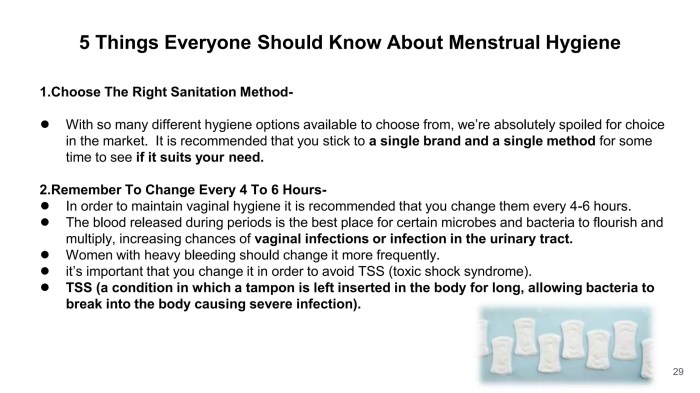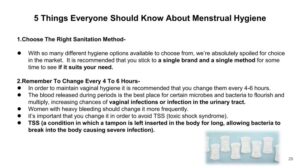
Menstrual health awareness is a crucial aspect of women’s health that often goes overlooked. By shedding light on this topic, we can empower women to take charge of their health, understand their bodies, and seek the resources they need. Education, support, and nutrition play pivotal roles in ensuring that women experience their menstrual cycles positively and healthily.
From educational programs that equip individuals with knowledge to resources aimed at enhancing community awareness, menstrual health is interconnected with mental well-being and nutrition. Understanding how these elements work together not only fosters better health outcomes but also cultivates a supportive environment for women everywhere.
Menstrual Health Education

Menstrual health education is a crucial aspect of women’s health that goes beyond the basics of menstruation. Raising awareness about menstrual health contributes to a holistic understanding of reproductive health, empowering individuals to manage their menstrual cycles with confidence and knowledge. This awareness plays a pivotal role in breaking the stigma surrounding menstruation, fostering an environment where discussions about periods and related health issues are normalized.Educational programs on menstrual health are vital in providing accurate information and resources.
They equip young individuals with the knowledge needed to understand their bodies and recognize when to seek medical advice. Several initiatives aim to improve menstrual health education, focusing on various age groups and communities. These programs often emphasize the importance of sanitary products, menstrual hygiene, and the socio-cultural issues surrounding menstruation.
Available Educational Programs for Menstrual Health
Various educational programs exist to enhance menstrual health awareness across different demographics. Schools and community organizations often implement these programs to address the needs of young individuals and women.
- School-based Programs: Many schools incorporate menstrual health education into their health curriculum. These programs often include interactive workshops that cover topics such as menstrual cycles, hygiene practices, and the physiological changes that occur during menstruation.
- Community Workshops: Non-profit organizations frequently conduct workshops in local communities to educate women and girls about menstrual health. These workshops aim to reduce stigma and provide practical advice on menstrual hygiene management.
- Online Resources: Numerous websites and online platforms offer educational materials related to menstrual health. These resources include articles, videos, and infographics that explain menstrual health topics in a user-friendly manner.
- Peer Education Programs: Some initiatives train young individuals to become peer educators, allowing them to share knowledge and support their peers regarding menstrual health and hygiene.
Resources for Schools and Communities
To effectively improve awareness of menstrual health, schools and communities can utilize a range of resources. These resources can help foster a supportive environment for discussions on menstruation and related health issues.
- Educational Toolkits: Toolkits containing lesson plans, activities, and informational pamphlets can be distributed to schools and community organizations. These materials provide a structured approach to teaching menstrual health.
- Partnerships with Health Organizations: Collaborating with local health organizations can help schools access expert knowledge and resources, such as guest speakers and workshops tailored to specific age groups.
- Menstrual Hygiene Products: Ensuring access to menstrual hygiene products in schools and community centers is essential. Providing free or subsidized products can help alleviate the financial burden that some individuals face.
- Awareness Campaigns: Implementing awareness campaigns using social media, posters, and community events can engage the public and promote understanding of menstrual health topics.
“Menstrual health is not only a personal issue but a critical public health concern that affects women’s education, employment, and overall well-being.”
Impact of Menstrual Health on Mental Well-being
Menstrual health plays a significant role in influencing mental well-being. Women often experience various emotional and psychological changes throughout their menstrual cycles, which can impact their daily lives. Understanding this relationship is essential for promoting mental health and providing effective support for those affected.The connection between menstrual health and mental well-being is multifaceted. Hormonal fluctuations during the menstrual cycle can influence mood and emotional stability.
For instance, some women may experience heightened emotions or irritability, particularly during the luteal phase, which precedes menstruation. These changes can significantly affect daily functioning, relationships, and overall quality of life.
Connection Between Premenstrual Syndrome (PMS) and Mental Health Disorders
Premenstrual Syndrome (PMS) is a common condition characterized by a range of physical and emotional symptoms, affecting many women in their reproductive years. PMS can manifest as mood swings, anxiety, depression, and irritability, which are closely linked to mental health disorders.Studies have shown that a significant number of women with PMS also meet the criteria for mental health disorders, such as major depressive disorder and generalized anxiety disorder.
The overlap between these conditions emphasizes the importance of recognizing PMS as a serious health issue rather than merely a nuisance.
-
Research indicates that about 50% of women with PMS report significant depression and anxiety symptoms.
- This correlation suggests that managing PMS effectively may lower the risk of developing more severe mental health issues.
- Addressing these symptoms through holistic approaches can improve both menstrual health and mental well-being.
Strategies for Managing Mental Health During Menstrual Cycles
Managing mental health during menstrual cycles requires an integrated approach. It’s essential to recognize the symptoms and prepare strategies that can alleviate emotional distress. Various methods can enhance emotional stability and mental health during menstruation.Incorporating lifestyle changes can be beneficial. Regular physical activity, balanced nutrition, and adequate sleep are foundational elements that support both physical and mental health. Engaging in gentle exercises like yoga or walking can help alleviate tension and improve mood.
- Practicing mindfulness and meditation techniques can foster emotional resilience and help manage stress levels effectively.
- Maintaining a symptom diary can provide insights into emotional patterns, helping to identify triggers and effective coping strategies.
- Consultation with healthcare professionals may be necessary for more severe symptoms. They can provide appropriate interventions, including counseling or medication when needed.
Additionally, seeking support from friends, family, or support groups can provide a sense of community and understanding. Open discussions about menstrual health can help reduce stigma and promote a more supportive environment for those experiencing these challenges.
Nutrition and Menstrual Health
Nutrition plays a crucial role in managing menstrual health, providing the body with essential nutrients that can alleviate discomfort and enhance overall well-being during the menstrual cycle. Understanding dietary choices is vital for women looking to support their bodies during this time. A well-balanced diet not only influences physical symptoms but can also positively impact mental health and emotional stability.Certain vitamins and minerals are particularly beneficial for menstrual health, contributing to the reduction of cramps and other symptoms associated with menstruation.
Nutrients like magnesium, vitamin B6, and omega-3 fatty acids help ease muscle tension and improve mood. Incorporating these nutrients into daily meals can significantly enhance comfort during the menstrual cycle and promote better health.
Dietary Choices for Enhanced Menstrual Health
To maintain optimal menstrual health, certain foods should be prioritized. The right dietary choices can help stabilize hormone levels and reduce discomfort. Here are key foods and their benefits:
- Leafy Greens: Rich in magnesium, greens like spinach and kale help relax muscles and reduce cramps.
- Fatty Fish: Salmon and mackerel provide omega-3 fatty acids, known for their anti-inflammatory properties that can alleviate menstrual pain.
- Nuts and Seeds: Almonds and sunflower seeds are high in vitamin E and magnesium, promoting hormonal balance and reducing mood swings.
- Whole Grains: Foods like quinoa and brown rice provide fiber, helping regulate blood sugar levels and stave off cravings.
- Fruits: Berries and bananas are rich in vitamins and antioxidants, supporting overall health and mood improvement.
Vitamins and Minerals in Menstrual Health
Vitamins and minerals are integral to reducing menstrual discomfort. Incorporating specific nutrients can provide significant relief:
- Magnesium: Helps to relax muscles and can reduce cramps. Foods rich in magnesium include dark chocolate, avocados, and legumes.
- Vitamin B6: Aids in mood regulation and can alleviate PMS symptoms. Sources include chicken, potatoes, and fortified cereals.
- Calcium: Important for muscle function and can help ease cramps. Found in dairy products, leafy greens, and fortified plant-based milks.
- Iron: Essential for replenishing lost iron during menstruation. Sources include red meat, lentils, and spinach.
- Omega-3 Fatty Acids: Help reduce inflammation and menstrual pain. Found in fatty fish, flaxseeds, and walnuts.
Meal Plan for Menstrual Cycle
Creating a meal plan tailored to menstrual health can significantly enhance comfort and well-being. Here’s a sample meal plan designed to provide essential nutrients throughout the cycle:
| Day | Breakfast | Lunch | Dinner | Snacks |
|---|---|---|---|---|
| Day 1-5 | Oatmeal with bananas and almonds | Quinoa salad with chickpeas and spinach | Grilled salmon with steamed broccoli | Greek yogurt with berries |
| Day 6-14 | Smoothie with spinach, banana, and flaxseed | Whole grain wrap with turkey and mixed greens | Stir-fried tofu with bell peppers and brown rice | Carrot sticks with hummus |
| Day 15-21 | Scrambled eggs with avocado and whole grain toast | Lentil soup with whole grain bread | Baked chicken with sweet potatoes and asparagus | Trail mix with nuts and dried fruit |
| Day 22-28 | Chia pudding with almond milk and mango | Spinach salad with grilled chicken and walnuts | Pasta with marinara sauce and lean turkey meatballs | Dark chocolate and strawberries |
“A balanced diet rich in essential nutrients can significantly ease menstrual discomfort and enhance overall well-being.”
Concluding Remarks

In conclusion, enhancing menstrual health awareness is not just about addressing biological processes but also about recognizing the emotional and psychological dimensions of women’s health. By promoting education, understanding mental health connections, and advocating for nutritional strategies, we can create a more informed and supportive community. Let’s continue the conversation and ensure that menstrual health remains a priority for all.
Helpful Answers
What is menstrual health awareness?
Menstrual health awareness refers to the understanding and education surrounding menstrual cycles, their impact on women’s health, and the importance of proper care and nutrition.
How can I manage PMS symptoms?
Managing PMS symptoms can include dietary adjustments, regular exercise, stress management techniques, and consulting healthcare providers for appropriate treatment options.
Are there specific foods that can help during menstruation?
Foods rich in iron, magnesium, and omega-3 fatty acids, such as leafy greens, nuts, and fish, can help alleviate menstrual discomfort.
Why is menstrual health linked to mental health?
The hormonal changes during the menstrual cycle can influence mood and emotional stability, making it important to recognize and address these changes.
What resources are available for menstrual health education?
Many schools, community organizations, and online platforms offer educational programs and resources dedicated to promoting menstrual health awareness and education.





